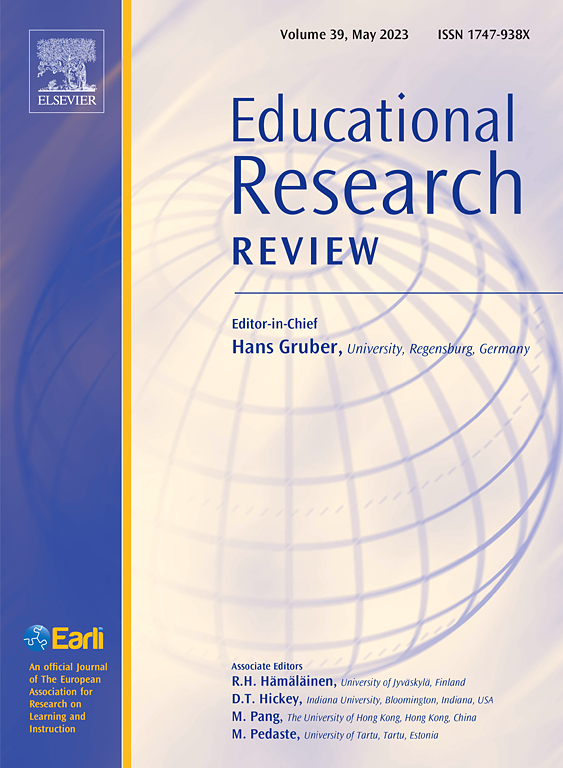成长心态的影响因素:系统文献综述
IF 10.6
1区 教育学
Q1 EDUCATION & EDUCATIONAL RESEARCH
引用次数: 0
摘要
自Dweck于2006年提出成长心态的概念以来,它在各种教育背景下得到了广泛的探索。然而,以往的文献综述主要关注成长心态的影响,而不是研究其影响因素。当前的文献综述旨在澄清有助于学生成长心态形成的因素。根据系统评价和荟萃分析(PRISMA)指南的首选报告项目,我们选择了过去十年的54篇实证文章作为样本进行分析。在布朗芬布伦纳的生态系统理论框架内,采用自下而上的四步编码过程对这些文章进行了分析。揭示了个体系统和微系统内的许多影响因素。在以往的研究中,最常见的因素类别包括学生的心理特征、教师的教学策略和方法、父母教养方式、具体干预措施和学校环境。确定了两个协同路径来说明这些影响因素的相互作用。最后,本研究讨论了不同生态系统中各因子的意义,并对未来的研究提出了建议。本文章由计算机程序翻译,如有差异,请以英文原文为准。
The influencing factors of growth mindset: A systematic literature review
Since the concept of growth mindset was introduced by Dweck in 2006, it has been extensively explored within various educational contexts. However, previous literature reviews have primarily focused on the effects of growth mindset rather than examining its influencing factors. The current literature review seeks to clarify the factors that contribute to the formation of a growth mindset among students. Adhering to the Preferred Reporting Items for Systematic Reviews and Meta-Analyses (PRISMA) guidelines, a sample of 54 empirical articles from the past decade was selected for analysis. These articles were analysed using a four-step bottom-up coding process within the framework of Bronfenbrenner's ecological systems theory. Many influencing factors within the individual system and microsystems were revealed. The most frequently examined factor categories in previous studies include students' psychological features, teachers' teaching strategies and methods, parenting styles, specific interventions, and school environment. Two synergistic paths were identified to illustrate the interplay of these influencing factors. Finally, the current study discusses the significance of factors within different ecological systems and proposes suggestions for future studies.
求助全文
通过发布文献求助,成功后即可免费获取论文全文。
去求助
来源期刊

Educational Research Review
EDUCATION & EDUCATIONAL RESEARCH-
CiteScore
19.40
自引率
0.90%
发文量
53
审稿时长
57 days
期刊介绍:
Educational Research Review is an international journal catering to researchers and diverse agencies keen on reviewing studies and theoretical papers in education at any level. The journal welcomes high-quality articles that address educational research problems through a review approach, encompassing thematic or methodological reviews and meta-analyses. With an inclusive scope, the journal does not limit itself to any specific age range and invites articles across various settings where learning and education take place, such as schools, corporate training, and both formal and informal educational environments.
 求助内容:
求助内容: 应助结果提醒方式:
应助结果提醒方式:


